Digital transformation of the midmarket
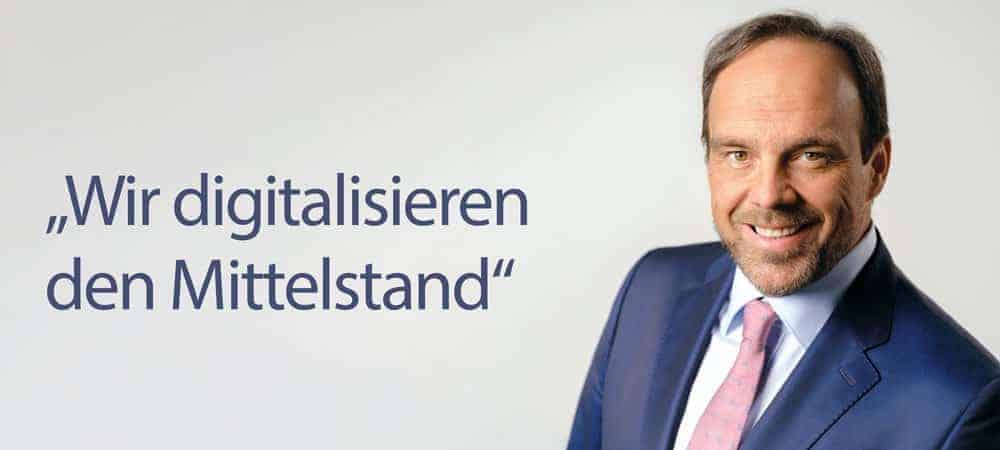

Digital transformation is a young task with old roots. The term itself has been around for a few years. The attempt to map a company's structural and process organization holistically in software has existed since SAP was founded almost 50 years ago.
Many terms came and went, but what always counted and led to success was the experience of the consultants. One SAP partner with both historical and current digital knowledge is Telekom Deutschland.
"Deutsche Telekom has been offering SAP-related services for more than 20 years, initially for large companies via T-Systems and for more than ten years now also for SME customers"
emphasizes Hagen Rickmann, Managing Director Business Customers at Telekom Deutschland, at the beginning of the E-3 discussion. This is where existing SAP customers can find in-depth knowledge.
"We work closely with our colleagues at T-Systems, who are also responsible for operating our own data centers, both for private and public cloud services"
explains Hagen Rickmann. Telekom itself also operates one of the world's largest SAP systems.
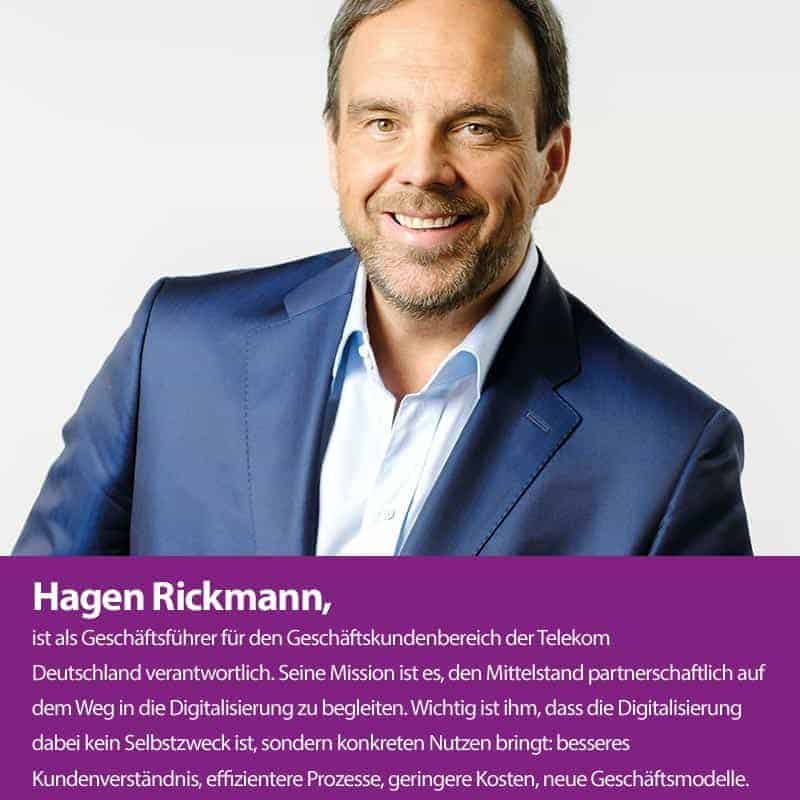
"This expertise also flows into customer projects"
explains Rickmann.
"We also use this concentrated SAP expertise for SMEs. We do this because SAP projects cannot simply be classified according to the size of the customer.
Corporate structures play a more important role here: number of employees, locations, national or international, SAP structure, migration from old to new system, from private to public or hybrid cloud, etc.
We can demonstrate best practices and have implemented solutions for all these different requirements that an SAP project can entail."
The SAP know-how in the entire company is very extensive, as T-Systems in particular has already successfully implemented hundreds of SAP projects of all kinds.
"In total, we have over 4,000 SAP consultants at Telekom. We also have access to a partner ecosystem of more than 30 partners. We pool this know-how and deploy the project teams according to the required expertise"
is how Hagen Rickmann describes the current situation in the SAP community. Finding young talent is not easy, but Deutsche Telekom is an attractive employer.
Managing Director Rickmann knows that the youngsters appreciate working with other products in addition to SAP in their projects.
"Especially as we are always on the lookout for lateral entrants in order to promote the creativity and inspiration of our employees. As we implement many exciting and varied projects, some of which are also international, we have few problems recruiting and, more importantly, retaining SAP experts.
We are also one of the largest training companies in Germany and take on a high percentage of trainees"
adds Rickmann.
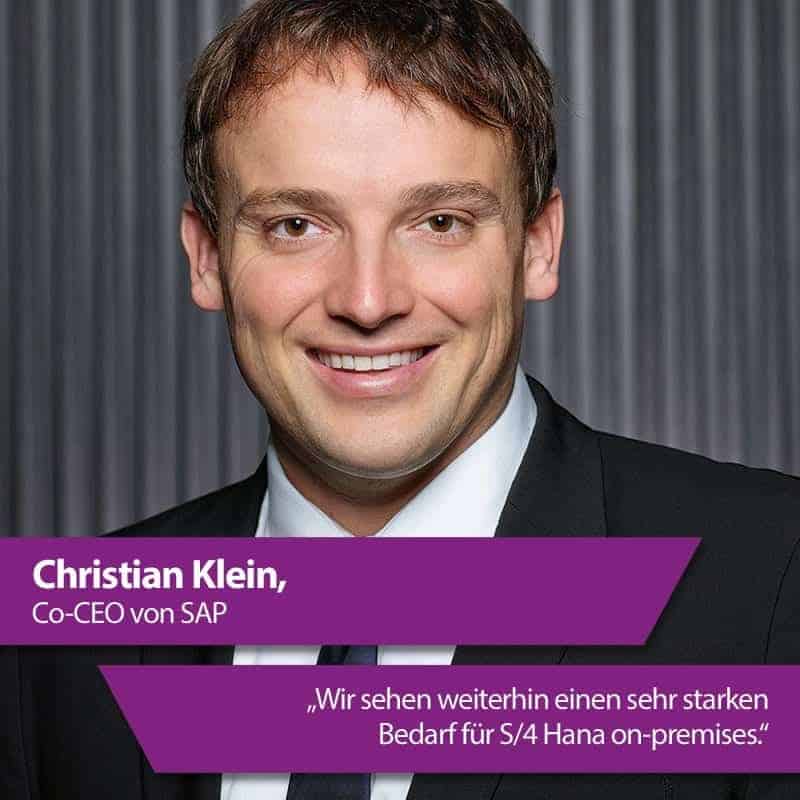
Cloud, right?
How sustainable is the cloud trend in the SAP community? Most existing SAP customers in German-speaking countries have a successful data center past, have built up a lot of knowledge and now have very low operating costs.
SAP Co-CEO Christian Klein said in an exclusive interview with E-3:
"We continue to see a very high demand for S/4 Hana on-premises among many of our existing customers. That's why we will continue to invest here. We are also well advised to support customers with hybrid solutions. There will also be customers in the future who want to run their applications in their own data center."
And Hagen Rickmann, Managing Director Business Customers at Telekom Deutschland, says:
"As SAP is a business-critical core system, there will continue to be a need for on-premises installations. However, I think that the trend towards the cloud will be sustainable and that the transformation to SAP S/4 Hana in particular will strengthen the trend towards the cloud."
Every existing SAP customer must consider how to proceed with their own SAP strategy. And as the cloud has now reached a high level of maturity, this fits in well with the timing.
"However, I think that the trend is not towards a pure public cloud solution, but that most companies will have a hybrid landscape"
analyzes Rickmann.
"Here too, the solutions are so advanced that operating a hybrid solution works very well. As far as SMEs are concerned, I believe that a public cloud variant makes sense in the long term for various reasons.
Anyone who does not need to map any unusual processes in their company is better off with standard solutions from a financial and organizational perspective.
The shortage of skilled workers in Germany alone is a weighty reason to free oneself from the burden of non-competitive tasks. It is certainly still essential to have very good IT employees in your own ranks who can then see things from the customer's perspective."
Sabine Bendiek is CEO of Microsoft Germany and talks about hybrid landscapes in the SAP community:
"Cloud computing offers access to high-performance, state-of-the-art IT capacities or applications at any time and without advance notice at low cost, which are only billed according to actual consumption.
Instead of rigid capital commitment and depreciation, costs are allocated to the operating budget, thereby reducing financial risks. We are only just experiencing the beginning of a gigantic wave.
Azure is the only environment that consistently supports the hybrid scenarios that are increasingly in demand, integrates existing investments and can be seamlessly integrated with other systems such as Office 365."
Even traditional SAP on-premises customers are increasingly having to deal with cloud issues. More and more applications are only being offered by SAP as cloud solutions.
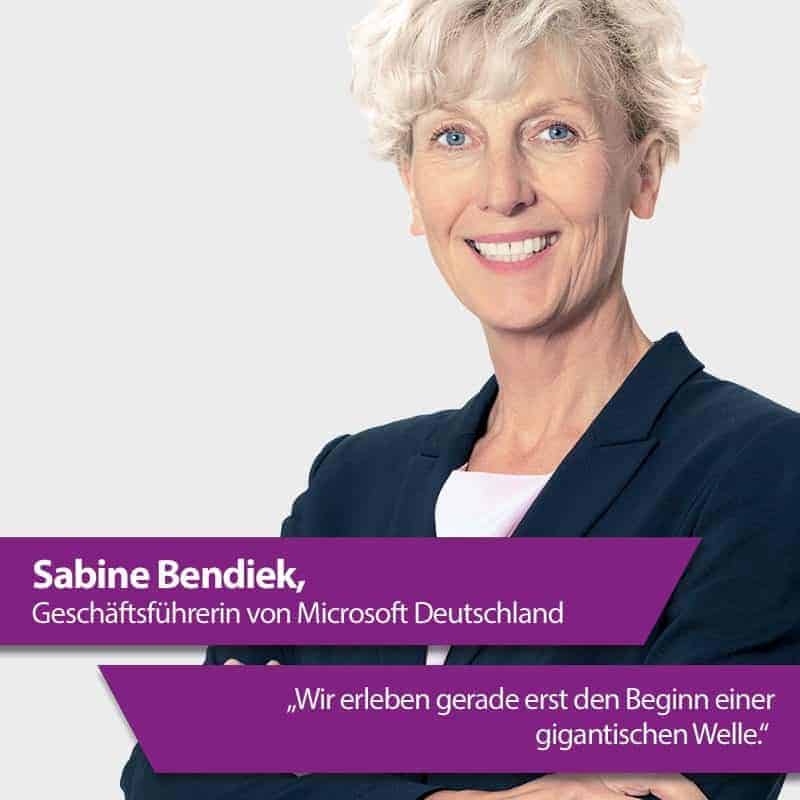
"Fortunately, SAP supports customers with many hybrid scenarios. For example, customers can keep their systems on-premises and connect them to the PaaS solution SAP Cloud Platform or the SaaS solution SuccessFactors via the SAP Cloud Connector"
explained Sabine Bendiek in the E-3 cover story November 2019.
What does Telekom offer existing SAP customers? On-premises, hybrid or cloud only?
"There will still be everything"
assures Hagen Rickmann in the E-3 interview.
"On-premises, cloud, hybrid, multi. And every company that is about to migrate to SAP S/4 Hana or install SAP for the first time should approach the question of what could be the right solution for their own company with an open mind"
advises Rickmann.
If you have your own data center in top condition and enough SAP expertise in-house to operate it, you don't necessarily need to move to the cloud. However, anyone starting out on a greenfield site should opt for the cloud, says Hagen Rickmann and adds:
"We are noticing that more and more customers are interested in the cloud solution. They are struggling on so many fronts with digitalization, which requires so much different expertise, that they want to free themselves from purely technical matters. For them, the strategic aspects are much more important.
But no matter what our customers choose: We can handle everything. We can run public cloud scenarios with SAP on Azure, but also with Amazon Web Services (AWS) or our own Open Telekom Cloud. In the hybrid area, we can add further hyperscalers and operate a private cloud in one of our data centers.
And all of this end to end, with the right network and the prospect of integrating IoT, AI and big data as part of digitalization. I am convinced that only a few can offer this."
So how important are offerings that go beyond the SAP portfolio, such as workplace, IoT or analytics solutions, for an existing SAP customer?
"This is very important in the age of digitalization"
emphasizes Managing Director Rickmann.
More and more is based on data. This data should be available in all systems that can use it in any way. An overall view is needed to ensure that everything fits together. Hagen Rickmann therefore asks the questions:
"How do I get my machine data into the analysis systems? Is this data also interesting for SAP? And anyone who uses Microsoft 365, for example, also wants to be connected to SAP. So the days of isolated solutions are largely over."
In many companies, especially in larger SMEs, many processes have already been optimized. Improvements can only be achieved here if the individual areas of the company are even more closely interlinked and further insights can be derived based on data and AI/machine learning solutions.
"SAP itself talks about the intelligent enterprise and includes intelligent technology such as AI, machine learning, IoT and other analyses"
Hagen Rickmann knows from numerous executive discussions.
"It's also about automating processes. That's what digitalization is all about." And this requires SAP on the one hand, but also special solutions that are tailored to specific industries.
"The demand for such solutions is increasing"
explains Rickmann,
"However, they should not be introduced and used in isolation, but should be integrated into a system landscape. As Telekom, we can take care of the selection, integration and operation."
"SAP user companies continue to invest in SAP's cloud solutions to extend their processes outside the core"
DSAG Chairman Marco Lenck also knows this and explains the requirement that this can be carried out as a standardized, uniform process without modifications.
In terms of the relevance of application platforms (platform as a service, not infrastructure), Microsoft Azure is clearly ahead with 24% of "high and medium" investments, according to the DSAG Investment Report 2020. SAP Cloud Platform follows in second place with 14%.
"This constellation could be due to the fact that Microsoft is primarily used as a general digitization platform in companies and the SAP Cloud Platform is rather the first choice as a platform for SAP solutions"
comments Marco Lenck on the result.
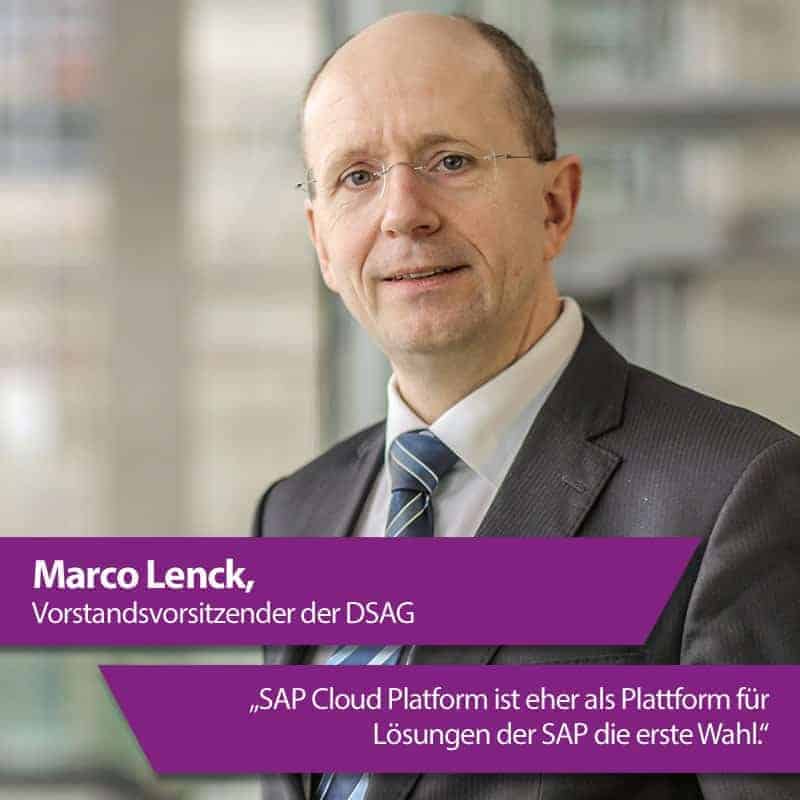
The path to S/4 is a challenge from a business, organizational, technical and licensing perspective. Otherwise there wouldn't be so many discussions about it, says Hagen Rickmann and specifies:
"If this could be done with the click of a mouse, we wouldn't hear about S/4 Hana. But I don't see the risks so much as the opportunities, both in terms of business management, organization, technology and licensing.
And here, too, everything pays off. If I take the opportunity to put my company organization to the test and make the right adjustments, I will make the company fit for the future.
This has a positive effect on the business management part. Ideally, I reduce costs and increase turnover and profitability. In terms of IT, I bring my company up to date, for example by transferring at least parts of my IT to the cloud.
Here, too, I am laying the foundation for more digitalization and a profitable future. And in terms of licensing law, things can only get better."
The money is literally sitting on the servers in the form of unused and expensive licenses. If you move to the cloud, you can save a lot of money here alone.
If existing SAP customers opt for a cloud operating model, they are initially in a comfortable position because there are many providers - from the Chinese giant Alibaba to the hyperscalers and SAP Embrace partners Microsoft, AWS and Google to regional SAP partners such as Itelligence, All-for-One, Scheer, etc.
"The crucial difference is that Deutsche Telekom can handle SAP end to end - from analysis, consulting, selecting the right cloud, migration and operation through to connection"
Hagen Rickmann knows from many successful customer projects.
"We cooperate with hyperscalers, with SAP itself and with regional SAP service providers and have our own data center capacities in Germany. These include our own public cloud, the Open Telekom Cloud.
We are very close to our customers throughout Germany and can scale as required. And we take a completely neutral approach to an SAP project and can offer customers the optimum SAP solution in each case.
Our customers often don't have the resources available for multi-provider management."
SAP's portfolio is very broad and ranges from AI and IoT to experience management with Qualtrics. For many existing SAP customers, it is important to think outside the box. SAP is an open and compatible system, which brings many advantages for existing customers and partners.
"We deliberately chose SAP for our ERP solutions"
explains Rickmann.
"And since SAP is also available for SMEs and now also from the cloud, there is little to be said against SAP. But when it comes to CRM, business analytics queries or other special solutions, we are happy to recommend other products.
We also opted for Salesforce ourselves, as it was a better fit despite our own SAP system. We need to advise our customers with exactly the same mindset."



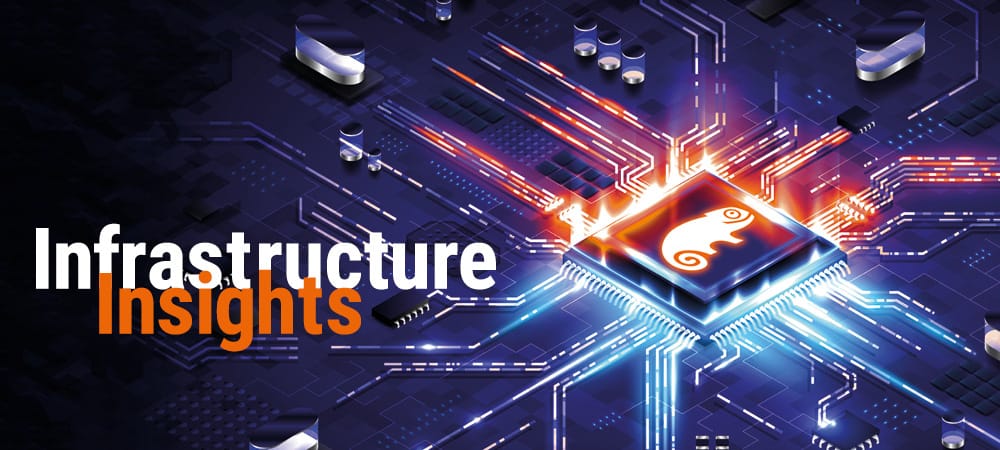




1 comment
Rolf Brilla
Das ist wirklich peinlich für die Telekom. Die bringen nicht ansatzweise eine flächendeckende digitale Infrastruktur hin und wollen den Mittelstand digitalisiert bekommen.